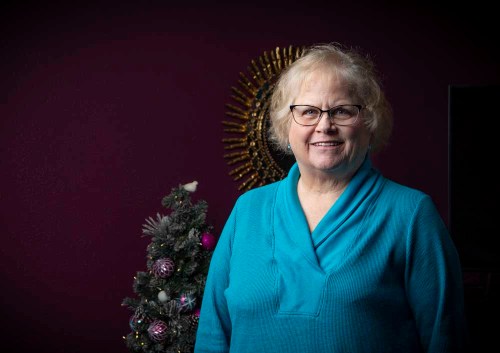The human toll: 71-year-old woman from Hermiston reflects on a hellish month with COVID-19
Published 5:00 am Tuesday, December 22, 2020

- Phyllis Hansell, 71, poses for a portrait in the living room of her Hermiston home on Thursday, Dec. 17, 2020. She suffered through joint pain, weight loss, sinus infections and troublingly low oxygen levels. An experimental treatment — monoclonal antibodies — may have saved her from being hospitalized.
HERMISTON — It was the Sunday after Thanksgiving when Phyllis Hansell awoke to a splitting headache.
“It felt like somebody shot me between the eyes,” she said.
Trending
She leaned over and reached for her daily medication, but she was so dizzy that she couldn’t read the labels.
“It took me an hour and 20 minutes to do it,” she said, adding that the pills included blood pressure medication. “I sat there looking at it. I was afraid I would take too many pills and do something crazy.”
It had been two days since Hansell tested positive for COVID-19. At 71, she has underlying conditions, like chronic obstructive pulmonary disease — an inflammatory disease that obstructs air from flowing to her lungs.
Seeing as she was especially vulnerable, Hansell said she was always careful to avoid largely populated areas and to wear her mask. But after a short trip to the grocery store to buy food for Thanksgiving, the virus hit “like a ton of bricks,” she said.
She quickly lost her taste and appetite, just before Thanksgiving, and in the following three weeks she would lose 15 pounds.
Hansell’s doctors grew worried. They called her every day to check in. Eventually her pulse oximeter showed readings in the low 90s, which made her and the doctors increasingly concerned that she may need to be hospitalized, she said.
Trending
Finally, she went to Good Shepherd Medical Center in Hermiston and received an IV infusion of monoclonal antibodies — a similar treatment to what President Donald Trump received in early October when he contracted the virus. Slowly but surely, her symptoms improved.
Hansell said that she was nervous to take the antibodies, because they are still considered “experimental.” But as a retired nurse practitioner, she knew she had to act fast before the virus reached the later inflammatory stages, which can prove deadly.
“You have to figure out if the benefit is better than the risk,” she said. “What if I don’t do anything and you get worse, and then you can’t have this stuff because you waited too long and missed the window.”
In November, the Food and Drug Administration issued an emergency use authorization for monoclonal antibodies for all patients who test positive for the coronavirus, saying the therapies “may help outpatients avoid hospitalization and alleviate the burden on our health care system.”
However, the U.S. Department of Health and Human Services found that only 250,000 of the 400,000 patient courses of monoclonal antibodies allocated for the states have actually been delivered. And even fewer are actively being used — somewhere between 5% and 20% of the available supply.
For Hansell, she believes the treatment came just in time.
“COVID is an inflammatory disease of the body and that’s why you’ve got to stop it early,” she said. “Those are the people who I’m afraid are dying — those who wait too long. They think, ‘I’ll just get over this.’ Not necessarily. You’ve got to be proactive on this thing. It’s a different virus than we’ve ever had.”
Hansell’s daughter, Rebekah, also contracted the virus. The two spent their quarantine sleeping nearly 14 hours per day and eating chicken noodle soup together, Hansell said. They each experienced joint pain, diarrhea and drowsiness, from which they are only just recovering.
“It’s interesting that some people think it’s not going to happen to them or it’s not real,” Hansell said. “But when it happens to you it’s very real. It’s intense. So you need to be careful. All age groups can be affected to a certain extent.”
Hansell also suffers from arthritis in her hip, and due to COVID-19, which is known to exacerbate joint pain, she’s had to use a cane for the first time since she fell off a horse about a year ago.
“It’s a whole body disease. It’s not just the flu,” she said. “Flu is bad enough — influenza attacks your lungs. But it doesn’t attack your heart and your kidneys and your joints.”
Though she is finally beginning to get some consistent sleep, Hansell said her symptoms have yet to subside in total — unlike her daughter, who is 43 and has since returned to work. The virus has left her with a sinus infection and her left ear is infected and clogged.
Upon her full recovery, Hansell is looking forward to volunteering at TruParent Pregnancy Clinic in Hermiston and getting a new puppy in the first week of January — a half-poodle, half schnauzer or “schnoodle.”
When reflecting on her loneliest days, Hansell holds nothing but gratitude for prayers, phone calls and small acts of kindness and love she received from her family and church.
“That people care and love you, that my doctor and friends would call me three times a day to make sure I was OK, I mean, that’s a lot of love,” she said. “God is good, and he got me through it. I didn’t have to go to the hospital, and I’m very grateful.”









